- Home
- Conn Iggulden
Conqueror (2011) c-5 Page 32
Conqueror (2011) c-5 Read online
Page 32
His men griped out of habit at the order, but they too had seen the Sung armies and there was relief amidst the final embraces. The families would go fast to the Chin border, crossing in the spring to safer lands. From there, Kublai had sent scouts to his own estates. They would be safe on their journey north. He had kept only the most skilful craftsmen and herders, the metalsmiths, rope-makers and leather-workers. Most of the gers would go, so the tumans would sleep uncovered in the rain and frost.
Kublai had to keep some carts for the forges and equipment supplies - his silver would go with him into the east. He knew the camp would be less cheerful from that point. It was no longer a moving nation but a war camp, with every man there dedicated to the tumans they supported.
The two massive groups slowly drew apart, with many shouting last words. The mounted tumans watched grimly as their families grew smaller in the distance. Chabi and Zhenjin remained with her servants, but no one dared object to the decisions of the khan’s own brother. They had scouted to the Chin border and there were no armies in that direction. The danger lay only in the east and every man in the tumans knew the work was not finished. It was hard to be cheerful on such a day.
It was still a host that trundled deeper into Sung lands, but there was already a sense of having cut away the fat. They kept a good pace and if there was no singing in the camps at night, at least the men were quietly determined. Without the individual wives, the warriors were fed from communal pots, filled to the brim with a thick broth each night.
As the days began to lengthen, Kublai passed sites of his own battles. He rode in sick horror through fields of rotting corpses. Foxes, wolves and birds had feasted and flesh sloughed off the bones, enemies and friends sliding into one another as they were made soft in sun and rain. His tumans rode through with utter indifference, making Kublai wonder how they could keep their food in their stomachs. His imagination forced him to consider his own death, left in a foreign field. He did not know whether such concerns troubled men like Uriang-Khadai, or whether they would admit the truth if he asked.
His scouts reported contact with a force of cavalry forty miles shy of Shaoyang, but whoever it was retreated at speed before the tumans, staying out of range and riding as if all hell was on their heels. Without an order being given, Kublai’s warriors began to increase their pace each day. The carts in the reduced camp fell back to the maximum range of twenty miles, within reach of a sudden assault if they came under attack. During the cold days, the men drank warm blood from the mares, sharing the slight wounds between three or four spare mounts so that none of the animals grew too weak. They were in their own battle trail and there were no fresh supplies to be had until they passed Shaoyang. Kublai wondered how the prefect there would react when he saw them return. He would survive their passing for a second time, something few men could say.
Kublai had understood at last that he had too few warriors to smash their heads against Sung walls. Eventually, the swarming enemy would grind his tumans into dust. He had made his decision and wondered if he was even the same man who had entered Sung lands with such youthful confidence. He could not have gambled it all back then. Now, he would drive them on to the heart of the empire in one great push. He would not stop for Shaoyang. He would not stop for anything.
His tumans could see men on the roofs of the sprawling city as they rode past. Kublai raised a hand to them, in greeting or farewell, he did not know. He would cut the heart out of the Sung dragon in one strike. The other cities had nothing to fear from him.
Past Shaoyang, the land had not been stripped of everything that might feed a hungry soldier. The first small towns were looted for food, though Kublai forbade their destruction. Back in the forest camp, his men had seen the great store of silver he had taken, handed down from a thousand horses, the bars passing from man to man and then placed in piles on the wet leaves. Though the tumans had not been paid in months, they knew at least that it existed and did not grumble too loudly or too often.
He did not expect yam riders, so far to the south. The lines of way stations had ended in Chin lands and when he saw not one but two of the men, they barely resembled the fast-moving endurance riders he knew. His scouts brought the pair in together and Kublai drew to a halt on a wide plain as he heard the jingle of bells from their saddle cloths. He nodded to Uriang-Khadai and the orlok bellowed orders to dismount and rest.
‘They look half dead,’ Bayar murmured to Kublai as the men rode up with his scouts on either side.
It was true enough and Kublai wondered how the men had been finding food without the yam stations to feed them or give them fresh mounts. Both were unkempt and one of them moved with obvious pain, grunting at every step of his horse. They came to a halt and Bayar told them to dismount. The first one slid from the saddle, staggering slightly as he landed. While he was searched, Bayar looked up into the grey face of his companion.
‘I have an arrow somewhere in my back,’ the yam rider said weakly. ‘It’s broken off, but I don’t think I can get down.’ Bayar saw how his right hand hung limp, flopping in the reins that were wrapped around it. He called one of his men and together they pulled the rider clear of his saddle. He tried not to cry out, but the strangled sound of agony he made was worse.
On the ground, Bayar lowered the man to his knees and looked at the arrow stump sticking out high on his shoulders. Every breath would have hurt and Bayar whistled softly. He reached down and prodded the stub, making the rider jerk away with a stifled curse.
‘It’s rotting the flesh,’ Bayar said. ‘I can smell it from here. I’ll have a shaman cut it out and seal it with fire. You’ve done well.’
‘Did anyone else reach you?’ the man said. He leaned forward on his locked arms, panting like a dog. Bayar shook his head and the yam rider swore and spat. ‘There were twelve of us. I’ve been searching and riding for a long time.’ The eyes were angry and Bayar bristled in response.
‘We were enjoying ourselves, seeing a bit of the local country. You found us in the end. Now would you like to deliver your message, or shall I have that arrow cut out first?’
The second rider had been searched and allowed to approach Kublai, opening his leather bag and handing over a folded sheet sealed with Mongke’s mark in wax. Bayar and the wounded man watched in silence as Kublai broke the seal and read.
‘No need now. He already knows.’
The wounded yam rider sagged and Bayar took him under the arms, ignoring the stink of sweat and urine. He could feel heat radiating from the flesh, a sure sign of fever. Even then, Bayar was surprised at the lack of weight. The young man had almost starved to bring the message and he wondered what could have been so important as to send twelve riders with the same message. Bayar knew enough to suspect no good news ever arrived in that way. He called one of his officers over.
‘Fetch a shaman. If he’s to live, the arrowhead will have to be dug out and the wound cleaned. Take him from me.’ He passed the dazed rider over and stood, unconsciously wiping his hands down his leggings.
Kublai had grown pale as he read. The sheet with its broken seal hung forgotten from his hand. He stared into the distance, his eyes like dull glass. Bayar’s mood sank further as he walked across to him.
‘As bad as that?’ the general said quietly.
‘As bad as that,’ Kublai confirmed, his voice hoarse with grief.
Xuan felt alive for the first time in years as he rode west. The old skills were still there, long dormant, like seeds beneath the autumn leaves. He could see his men felt the same. They had grown old in captivity, their best years wasted and thrown away, but with every mile they rode from Hangzhou, the past was further behind. More important than that was the news that had come as they left the city. Mongol scouts had been captured as they came south. Each carried an identical message written in the script of their homeland.
Xuan had seen one of the originals, still stained with the blood of its owner. Only a suspicious mind could have seen the benefits of
announcing the khan’s death as he rode south. Xuan had that mind, made so by years of captivity. Even so, he longed for the news to be true. He knew the traditions the Mongols followed so slavishly. If they returned home, it would be an answer to his prayers, indeed the prayers of the Sung nation.
He shook his head in the wind, clearing his thoughts with the physical movement. Whether Mongke Khan was truly dead or engaged in some dark game did not matter to him. Xuan did not know if he would live when they found Kublai’s tumans, but he was certain he would never return to Hangzhou.
He looked across at his eldest son, riding on his right hand. Liao-Jin was still swept up in the sheer ecstasy of freedom, no matter where they rode or who might face them. He had thrown himself into the training with all the energy of his youth. Xuan smiled to himself. The men liked him. He would have made a fine emperor, if there had been an empire for him to rule. None of that mattered. They were free. The word was like sweet summer to every man there.
In the chaotic activity of preparing eight thousand men to ride with Sung regiments, it had not been hard to bring Xuan’s other children out of captivity. Xuan had simply sent two of his men on horseback through the city streets, with orders in his own hand. No one had dared to question his new authority, or if they had, the responses had been too slow to stop them. Xuan had even hired servants for them with his Sung cousin’s silver. Given just one moonless night, he would send them north with a few of the best Chin men remaining to him. They would survive in their old lands, somehow. He had not yet told Liao-Jin that his son would travel with them, away from the Mongol tumans coming east.
On either side of the Chin force, Sung lords rode. Lord Jin An had been as good as his word and provided almost fifty thousand soldiers, half of them cavalry. Xuan had not known the young lord was a man of such power, but it seemed his clan had been leaders in the field of war for many generations. Lord Jin An had managed to persuade one other to join him, a cousin who brought another forty thousand to the ranks. To Xuan, it felt like a huge host, though both the Sung lords still seethed at the lack of support from the council, or the emperor himself.
They had brought hundreds of cannon that cut their pace down to a third of what it could have been, but Xuan took heart from the sight of those black tubes trundling along good Sung roads. There were times when Xuan could even dream of futures where he destroyed the Mongol army that was cutting its way through the Sung territories. A solid victory would unite even the council of lords, so that they would move as one against the greater threat in the north. On his most optimistic days, Xuan allowed himself to imagine his old lands returned to him. It was a good thought, but he smiled at his own foolishness. The Mongols had not been beaten for generations. He only wished Tsaio-Wen was there to see Chin soldiers riding with pride. The surly Sung officer had managed to vanish at the same time as the orders for him to report to the barracks had been sent. A coward at the last, Xuan thought. That too did not matter.
Shaoyang was not many miles ahead and the scouts were out, watching for the first sign of Kublai’s tumans. The Mongols had been in the area months before and Xuan did not expect them to be close, but he would find them. He would run them down. Xuan reached out and patted his horse’s neck, feeling again the exultation of being out at last. He turned to Liao-Jin and shouted above the noise of horses and men.
‘Take out the banners, Liao-Jin. Show the Sung who we are.’
He saw the flash of white teeth from his son as he passed on the orders to bannermen on either side. In its way, it had been the hardest task of the previous few months. Finding cloth had not been difficult, but Xuan had been forced to give the task to his own men, in case the news reached the lords or his emperor cousin and was forbidden before he could ride. They had shaped and sewed and cut the long banners, marking yellow silk with the painted chop of Xuan’s noble house. Xuan found he was holding his breath as the bannermen unfurled the cloth. The streaming banners fluttered in the wind, stretching out in lines of gold.
The last Chin army raised their heads. Many of them grew bright-eyed with tears at a sight they had never expected to see again. They cheered the banners of a Chin emperor and Xuan felt his throat grow thick with pride and grief and joy.
CHAPTER TWENTY-NINE
As the afternoon wore on, the tumans remained in the same place, just a few miles east of Shaoyang. The warriors saw that Kublai’s ger was being assembled and the constant, slight tension vanished. There would be no sudden order to mount and ride while the white ger was up. Between them, the eighty thousand men had three hundred thousand spare horses that ran together in a herd like the leaves of a forest, brown and grey and black and dun. As well as providing blood and milk for their riders, the ponies all carried some item of kit, from spare armour scales, ropes and glue, to hard blocks of cheese. It was the secret of their success that alone of all nations they could raid for hundreds of miles from the main camp.
Kublai seemed almost in a trance as he stood on the empty grassland, surrounded by the sea of horses and men. The carts of his camp could be seen in the distance, slowly coming up behind them. He was aware of Bayar walking over again to speak to him, but he did not reply, just stood in silence, drawn utterly into himself.
It had been Bayar’s order to raise the ger. The general was filled with apprehension. Whatever Kublai had read had left him pale and dumbstruck on the grassy plain. It was a crime punishable by flogging for a man to question a yam rider about his messages, but even so, Bayar watched closely as the man accepted tea and a pouch of bread and meat. The rider chewed with the same long stare that Bayar saw in Kublai and the general itched to take him for a walk and discover the truth.
The carts arrived without fanfare or any great welcome, now that the wives and children had gone. Oxen and camels were turned loose to graze. Forges were set up on the grass and fed with charcoal until the heavy iron glowed red. Warriors who needed something strolled in with no great urgency. All over the plain, others sat down to ease their legs and backs. Many of them took the chance to defecate in a place where they would not stay, or urinate into the grass. Others sharpened weapons and checked their bows and shafts as they liked to do at every opportunity. Some of them ate, others talked, but the strange stillness at the heart of the tumans was spreading out, so that more and more of them knew something was wrong.
When the ger was complete, Bayar approached Kublai again.
‘There is a place to rest, my lord,’ he said.
Kublai dragged his gaze back from very far away.
‘Bring my packs to me,’ he said softly. ‘There are things I need in them.’
Bayar bowed and trotted away. The strangeness of the day made him want to return to Kublai as soon as possible. He sent four scouts into the baggage carts to bring back the great rolls, tied with rope.
‘Put them inside,’ Bayar ordered the men. Kublai had not moved. ‘My lord, is the news so terrible? Will you tell me what’s wrong?’
‘The khan is dead, general,’ Kublai replied, his voice barely a whisper. ‘My brother is dead. I will not see him again.’
Bayar recoiled in shock. He shook his head as if he could deny the words. He watched as Kublai ducked into the ger, disappearing in the gloom within. Bayar felt as if he had been kicked in the chest, the air hammered out of him. He leaned forward, placing his hands on his knees as he tried to think.
Uriang-Khadai was close enough to see Bayar rocked by whatever Kublai had said to him. He approached the younger general with a wary expression, needing to hear, but at the same time deeply worried about what he might be told.
Bayar saw that there were many men nearby who had witnessed his reaction to the news. They had almost abandoned the pretence of not listening. Regardless of the penalties, he doubted the two yam riders would be left alone for long. The news could not be contained. Bayar found himself sweating at the thought. It would spread across the world. Campaigns would come to a halt, cities would grow still as they heard. The men of powe
r in the khanates would know they were thrown back into the maelstrom once again. Some of them would fear the future; others would be sharpening their swords.
‘Mongke Khan is dead,’ Bayar told his superior.
Uriang-Khadai blanched, but gathered himself quickly.
‘How did it happen?’ he said.
Bayar raised his hands helplessly. Everything Kublai had achieved in Sung lands was thrown into chaos by a single message. He could hardly think. Watching him, Uriang-Khadai’s lips thinned to a seam of pale flesh.
‘Get a hold of yourself, general. We have lost khans before. The nation goes on. Come with me to speak to the yam riders. They will know more than we have been told.’
Bayar stared. He followed as Uriang-Khadai strode away, heading to the unwounded rider who stared at him like a rabbit faced with a wolf.
‘You. Tell me what you know.’
The yam rider swallowed a mouthful of bread and meat painfully, then stood.
‘It was an assassin, general.’
‘Orlok,’ Uriang-Khadai snapped.
The man was trembling as he repeated the title.
‘Orlok. I was sent out with a dozen others. More went north to the Chin yam lines.’
‘What?’ Uriang-Khadai stepped closer to him. ‘You were in Sung territory?’
‘The khan was coming south, orlok,’ the man stammered, his nervousness growing. He knew yam riders were meant to be untouchable, but sooner or later, he was going to have to tell the manner of the khan’s death. It struck at the heart of every yam rider in the khanates. They would never be as trusted again.
‘How far away are they?’ Uriang-Khadai demanded. ‘How many men? Must I ask for every detail before it spills from your mouth?’

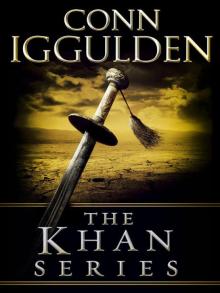 The Khan Series 5-Book Bundle
The Khan Series 5-Book Bundle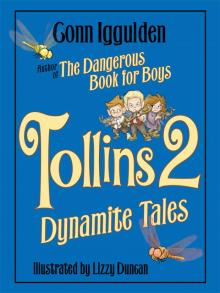 Tollins 2: Dynamite Tales
Tollins 2: Dynamite Tales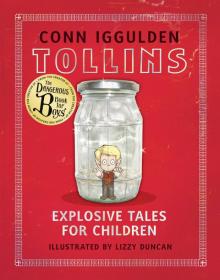 Tollins: Explosive Tales for Children
Tollins: Explosive Tales for Children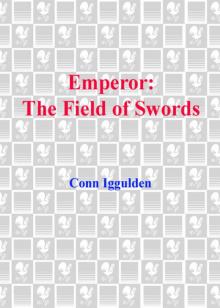 The Field of Swords
The Field of Swords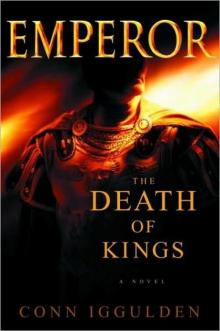 The Death of Kings
The Death of Kings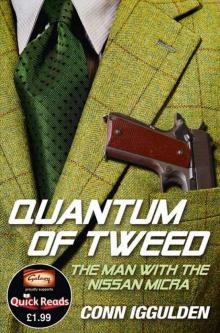 Quantum of Tweed: The Man With the Nissan Micra
Quantum of Tweed: The Man With the Nissan Micra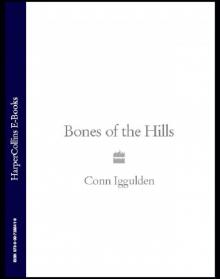 Bones of the Hills
Bones of the Hills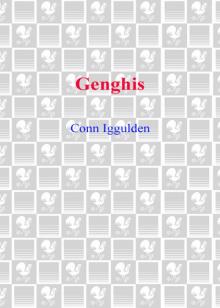 Genghis: Birth of an Empire
Genghis: Birth of an Empire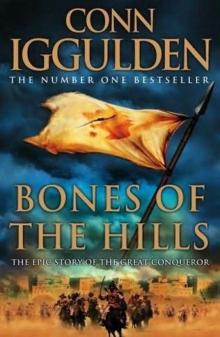 The Gates of Rome
The Gates of Rome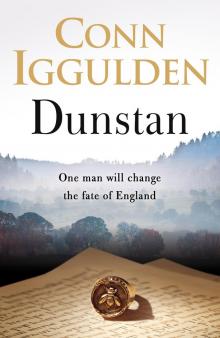 Dunstan
Dunstan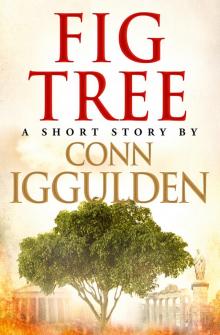 Fig Tree
Fig Tree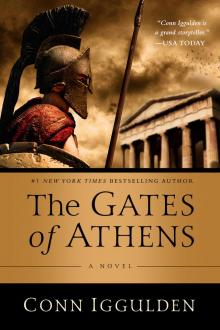 The Gates of Athens
The Gates of Athens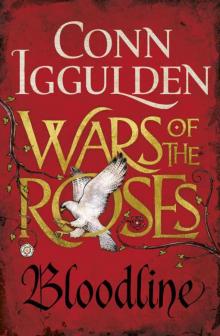 Stormbird
Stormbird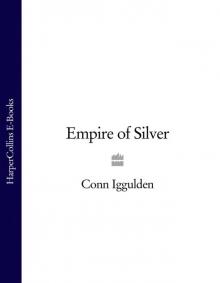 Khan: Empire of Silver
Khan: Empire of Silver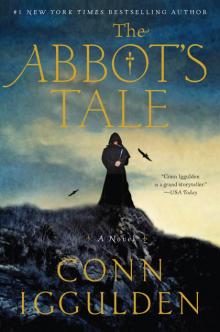 The Abbot's Tale
The Abbot's Tale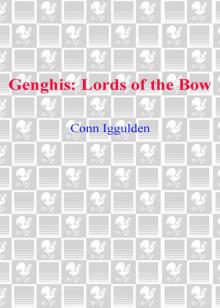 Gengis: Lords of the Bow
Gengis: Lords of the Bow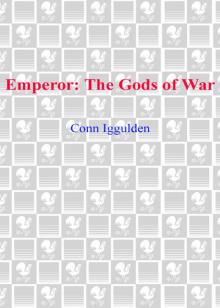 The Gods of War
The Gods of War Blackwater
Blackwater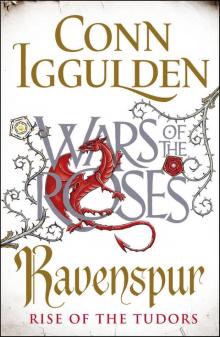 Ravenspur: Rise of the Tudors
Ravenspur: Rise of the Tudors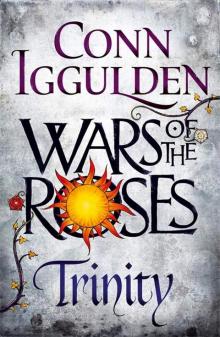 Wars of the Roses: Trinity (War of the Roses Book 2)
Wars of the Roses: Trinity (War of the Roses Book 2)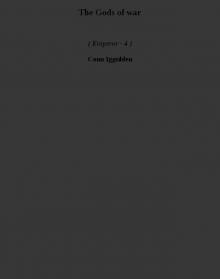 The Gods of war e-4
The Gods of war e-4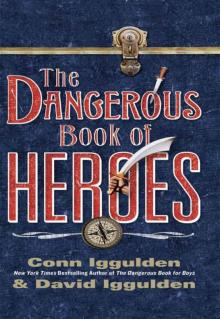 The Dangerous Book of Heroes
The Dangerous Book of Heroes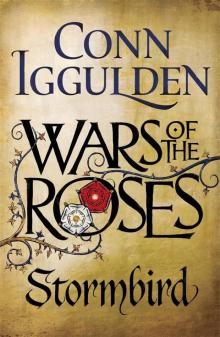 Stormbird wotr-1
Stormbird wotr-1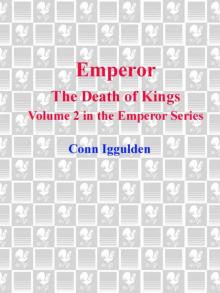 Emperor: The Death of Kings
Emperor: The Death of Kings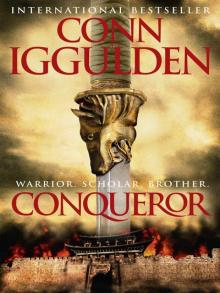 Conqueror (2011) c-5
Conqueror (2011) c-5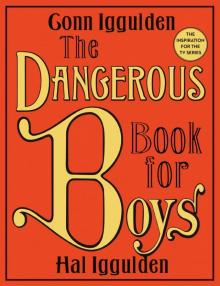 The Dangerous Book for Boys
The Dangerous Book for Boys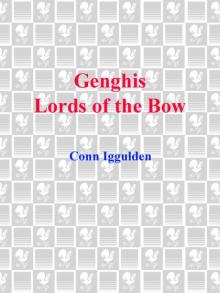 Genghis Lords of the Bow
Genghis Lords of the Bow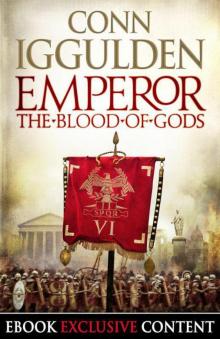 Emperor: The Blood of Gods (Special Edition) (Emperor Series, Book 5)
Emperor: The Blood of Gods (Special Edition) (Emperor Series, Book 5)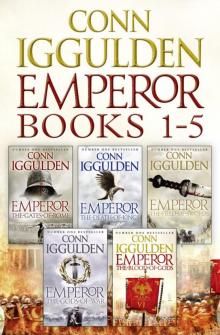 The Emperor Series: Books 1-5
The Emperor Series: Books 1-5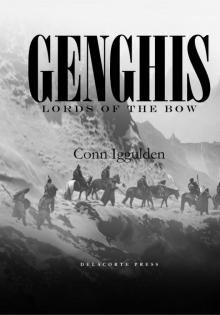 Lords of the Bow c-2
Lords of the Bow c-2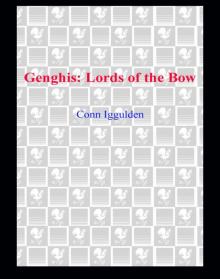 Lords of the Bow
Lords of the Bow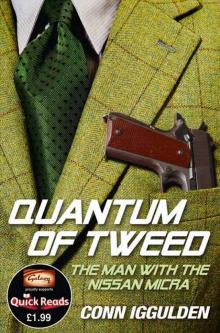 Quantum of Tweed
Quantum of Tweed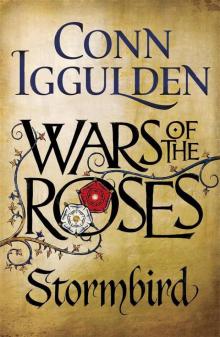 Wars of the Roses 01 - Stormbird
Wars of the Roses 01 - Stormbird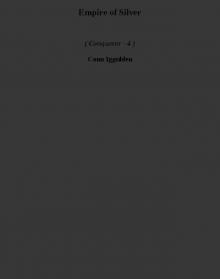 Empire of Silver c-4
Empire of Silver c-4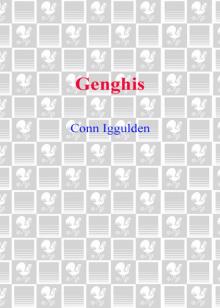 Birth of an Empire
Birth of an Empire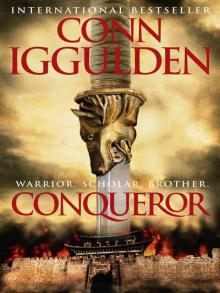 Conqueror (2011)
Conqueror (2011)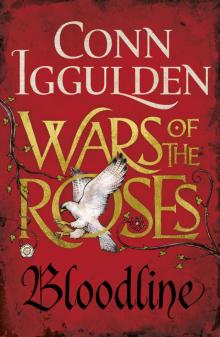 Wars of the Roses: Bloodline: Book 3 (The Wars of the Roses)
Wars of the Roses: Bloodline: Book 3 (The Wars of the Roses)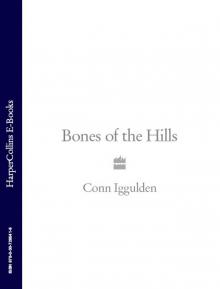 Bones Of the Hills c-3
Bones Of the Hills c-3 Empire of Silver
Empire of Silver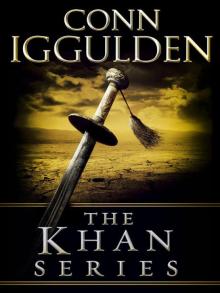 The Khan Series 5-Book Bundle: Genghis: Birth of an Empire, Genghis: Bones of the Hills, Genghis: Lords of the Bow, Khan: Empire of Silver, Conqueror
The Khan Series 5-Book Bundle: Genghis: Birth of an Empire, Genghis: Bones of the Hills, Genghis: Lords of the Bow, Khan: Empire of Silver, Conqueror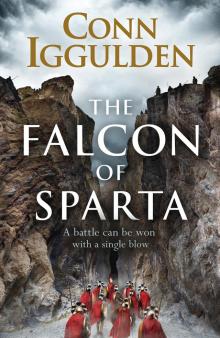 The Falcon of Sparta
The Falcon of Sparta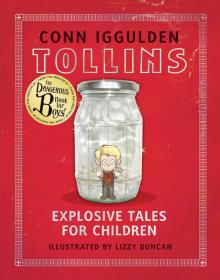 Explosive Tales for Children
Explosive Tales for Children